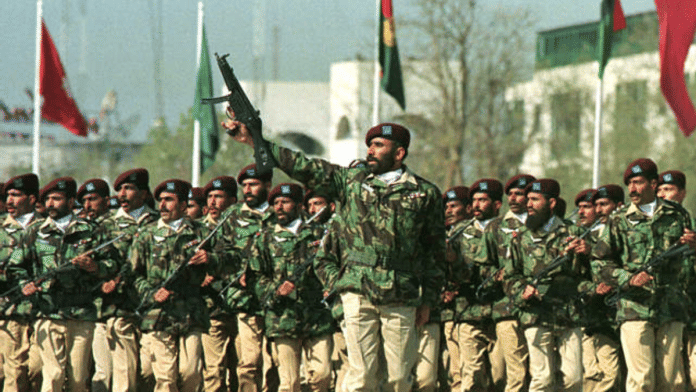Thank you dear subscribers, we are overwhelmed with your response.
Your Turn is a unique section from ThePrint featuring points of view from its subscribers. If you are a subscriber, have a point of view, please send it to us. If not, do subscribe here: https://theprint.in/subscribe/
In the sport of fencing, before all else, students are taught agility, composure, tactical awareness, and most importantly, the good humour to acknowledge when an opponent makes a clever move.
Nations, like fencers, can see their fortunes reversed in an instant. Just a year ago, Pakistan’s most popular leader was barred from contesting elections and locked in jail; its army stripped of credibility and loathed even in its Punjabi heartland; an economy staggering under debt, inflation, and unemployment; and citizens desperate to emigrate. Internationally, too, Pakistan was adrift. Washington had downgraded it from indispensable ally to unreliable nuisance. Europe, barring a nostalgic United Kingdom, looked away. The Gulf states, once financial lifelines, had grown weary of writing blank checks. Islamabad’s foreign policy seemed reduced to a handful of “brotherly” endorsements from Turkey, Azerbaijan, and Malaysia, alliances driven more by optics than substance.
Pakistan appeared a semi-pariah, weakened, brittle, and dangerously close to becoming irrelevant.
The Turnaround Post-Operation Sindoor
And yet, in less than twelve months, post Operation Sindoor, to be precise, the Pakistani state, or more accurately its military establishment, has managed to script a remarkable reversal. Domestically, the operation helped burnish the army’s reputation, restoring its role as the “ultimate protector” despite years of political manipulation and public anger. By wrapping itself once again in the mantle of national saviour, the army ensured that calls for civilian supremacy were muted and public distrust temporarily contained.
Internationally, it forced Washington and European capitals to look again at Pakistan, especially after India signalled intent to target its nuclear assets. Fear of nuclear instability, coupled with Islamabad’s time-tested ability to market its fragility, ensured renewed attention. In a world where crises compete for bandwidth, from Ukraine to Gaza, Pakistan succeeded in inserting itself back on the radar of Western policymakers, a feat many had thought impossible given its prior isolation.
Positioning at Home and Abroad
At the same time, Pakistan has adroitly repositioned itself in the Islamic world. Through carefully crafted propaganda and savvy social media campaigns, its generals revived the old narrative of being the lone Muslim power willing to stand up to a non-Islamic adversary. This projection resonated in Gulf monarchies, always wary of empowering their own strong generals but happy to outsource defence to Pakistan. The Saudi – Pakistani mutual defence assistance pact is a striking outcome, giving the Pakistani army both prestige and patronage. Beyond symbolism, such agreements could translate into new training missions, arms contracts, or preferential energy deals that Pakistan desperately needs to stabilize its economy.
Meanwhile, Islamabad learned the art of flattering the Trump administration, offering inducements ranging from access to crypto channels, to promises of oil and mineral wealth in Baluchistan, to the prospect of acting as a strategic doorway into China and Russia’s spheres. For an administration built on transactional diplomacy, Pakistan has positioned itself as a useful pawn on multiple boards, reviving a familiar Cold War-era pattern of leveraging geography into rent-seeking advantage.
Fragile Gains on Shaky Ground
Of course, none of this rests on solid foundations. Pakistan’s achievements stand on shaky ground, its narratives riddled with contradictions, its promises often outpacing its capacities.
The economy remains precarious, with debt repayments looming and foreign reserves still insufficient to inspire investor confidence. Civilian politics remains manipulated, with elected leaders alternately co-opted or crushed depending on military convenience. The military, while rehabilitating its image at home, still faces deep public distrust, especially among younger urban voters who increasingly view the institution as both arbiter and obstacle of democracy.
Externally, its manoeuvres are vulnerable to reversal, particularly if benefactors conclude that indulgence costs more than it yields. And yet, in geopolitics, optics often matter as much as realities. The perception of relevance can create new opportunities, and Pakistan has shown a remarkable ability to survive by playing its weaknesses as strengths.
India’s Cautious Acknowledgement
For India, this demands neither alarmism nor complacency. It requires recognition that Pakistan, far from fading into irrelevance, has once again demonstrated its knack for survival through manoeuvre and manipulation. Dismissing these moves as theatrics would be a mistake; overestimating their durability would be equally unwise. What New Delhi must calculate is how much bandwidth Islamabad’s resurgence truly demands at a time when India faces pressing strategic choices elsewhere, be it deepening its Indo-Pacific partnerships, navigating Trump’s tariff-driven trade wars, or balancing a volatile relationship with China.
The duel with Pakistan is not the only match being fought, but it remains one where vigilance is necessary. As fencers are taught, one must acknowledge a worthy thrust even from an adversary. For all the enmities between our nations, Pakistan’s establishment has, for the moment, executed a clever gambit. The duel is far from over, but the score has shifted, and it would be foolish not to notice. Touché.
These pieces are being published as they have been received – they have not been edited/fact-checked by ThePrint.


